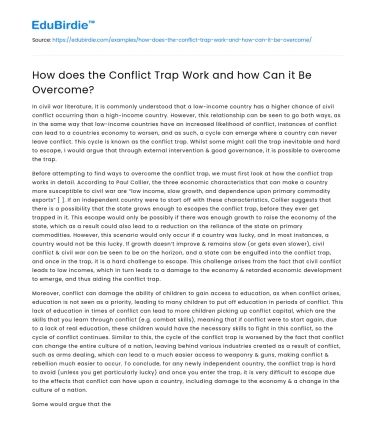In civil war literature, it is commonly understood that a low-income country has a higher chance of civil conflict occurring than a high-income country. However, this relationship can be seen to go both ways, as in the same way that low-income countries have an increased likelihood of conflict, instances of conflict can lead to a countries economy to worsen, and as such, a cycle can emerge where a country can never leave conflict. This cycle is known as the conflict trap. Whilst some might call the trap inevitable and hard to escape, I would argue that through external intervention & good governance, it is possible to overcome the trap.
Before attempting to find ways to overcome the conflict trap, we must first look at how the conflict trap works in detail. According to Paul Collier, the three economic characteristics that can make a country more susceptible to civil war are “low income, slow growth, and dependence upon primary commodity exports” [ ]. If an independent country were to start off with these characteristics, Collier suggests that there is a possibility that the state grows enough to escapes the conflict trap, before they ever get trapped in it. This escape would only be possibly if there was enough growth to raise the economy of the state, which as a result could also lead to a reduction on the reliance of the state on primary commodities. However, this scenario would only occur if a country was lucky, and in most instances, a country would not be this lucky. If growth doesn’t improve & remains slow (or gets even slower), civil conflict & civil war can be seen to be on the horizon, and a state can be engulfed into the conflict trap, and once in the trap, it is a hard challenge to escape. This challenge arises from the fact that civil conflict leads to low incomes, which in turn leads to a damage to the economy & retarded economic development to emerge, and thus aiding the conflict trap.
Save your time!
We can take care of your essay
- Proper editing and formatting
- Free revision, title page, and bibliography
- Flexible prices and money-back guarantee
Moreover, conflict can damage the ability of children to gain access to education, as when conflict arises, education is not seen as a priority, leading to many children to put off education in periods of conflict. This lack of education in times of conflict can lead to more children picking up conflict capital, which are the skills that you learn through conflict (e.g. combat skills), meaning that if conflict were to start again, due to a lack of real education, these children would have the necessary skills to fight in this conflict, so the cycle of conflict continues. Similar to this, the cycle of the conflict trap is worsened by the fact that conflict can change the entire culture of a nation, leaving behind various industries created as a result of conflict, such as arms dealing, which can lead to a much easier access to weaponry & guns, making conflict & rebellion much easier to occur. To conclude, for any newly independent country, the conflict trap is hard to avoid (unless you get particularly lucky) and once you enter the trap, it is very difficult to escape due to the effects that conflict can have upon a country, including damage to the economy & a change in the culture of a nation.
Some would argue that the conflict trap is inevitable & cannot be escaped but I would argue that there are a few approaches that can be undertaken to overcome the conflict trap. One way in which countries can overcome the trap is through external intervention. This approach relies on preventing war from occurring in a country in the first place, and as a result, this can prevent a country from falling into the cycle created by the conflict trap & prevent further war. One aspect of external intervention to prevent war from breaking out is seen through attempts by international organisations in controlling natural resources. A clear example of this is outlined in a World Bank Policy Research Report titled ‘Breaking the Conflict Trap: Civil War & Development policy’ which explains that the Kimberley process (a UN-initiated certification scheme to verify diamonds as conflict-free) has led to more transparency in the diamond market. This process has restricted the ability of rebel groups to gain income from natural resources, and as a result, rebel groups have less money to finance conflict and so “if rebel finances can be curbed and citizens come to believe that resources are being well used, civil war will be less likely” [ ]. Therefore, this highlights how the Kimberley process and external intervention in general can help a country to avoid conflict & civil war and thus overcome the conflict trap. Another way in which the conf






 Stuck on your essay?
Stuck on your essay?

